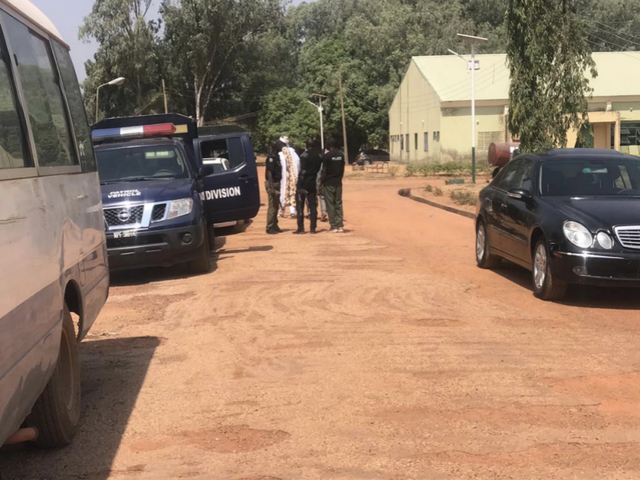(单词翻译:单击)
听力文本
Gunmen kidnapped children and teachers from an elementary school in northwestern Nigeria on Monday. It's the latest in a series of attacks on educational institutions. And they have grown more brazen since 2014 when a group of schoolgirls were abducted by the militant group Boko Haram. Joe Parkinson is Africa bureau chief for The Wall Street Journal. He described how another group of students, this time college-aged, were taken this past weekend. But first, note that some listeners may find the details disturbing.
JOE PARKINSON: They were seized by armed men in the early hours of Friday night. And within just a few hours on Saturday morning, what's now become a very familiar choreography played out. The kidnappers released a video with the schoolchildren in a forest, somewhere very difficult to determine. But we know it's somewhere in Nigeria's northwest. And the children themselves were asking the government to pay a ransom — in this case, 500 million naira. It's about $1.2 million. The video then went in a very dark direction where the masked men with Kalashnikovs who were walking around the children started to beat them with bullwhips. And they were shrieking out by the end of the video, just do what these men ask. So this has become all too familiar a choreography for Nigerians. We've seen more than 800 schoolchildren kidnapped in four separate attacks in recent months.
MARTINEZ: Wow. What's motivating all these kidnappings that keep happening? I mean, who's behind them?
PARKINSON: Well, kidnapping in Nigeria is not a new phenomenon. But it's got worse. And it's moved much more in the direction of poor people and schoolchildren. So the northwest of Nigeria is an impoverished part of the country. And actually, it's suffering from a real sort of degradation of the state. Nigeria is fighting numerous insurgencies on different fronts, particularly in the northeast, against Boko Haram. And the security services there just don't have the capacity. And so into that power vacuum these groups, these criminal groups, have moved. And they're exploiting it. There's something which is behind this as well, which is longer term, which is ethnic clashes between different groups in the northwest.
Many of the people who are part of these criminal groups are from the Fulani ethnic group, who are traditionally nomadic herders. And they've been clashing with Hausa community farmers, sedentary farmers. And these clashes have become more and more deadly, more and more murderous. Both sides have armed themselves. And the Fulani groups especially have become much more sophisticated and have gotten really into the kidnapping business in recent times. But the school kidnapping, the mass kidnapping of schoolchildren, is really something that's just started happening in the last six months.

MARTINEZ: And how has the government responded?
PARKINSON: Well, the government over the last few days has just really started to move and pledged a huge deployment of troops to the northwest. Some 6,000 soldiers are going to be moving in there. But a lot of people are saying it's too little, too late. These groups have really, really grown in capacity. They've been buying a lot of weapons from the countries that border Nigeria, which are suffering from their own insecurity — Niger, Mali, Burkina Faso and even guns coming down from Libya. What's remarkable is 800 students have been kidnapped. And not one minister, not one governor, not one senior official has apologized or has resigned. And so it's kind of difficult to sort of stocktake just the enormity of this. It's — you can't really imagine much more of a metric for state failure than the mass kidnapping of children in a place where they should be safe.
MARTINEZ: Joe Parkinson, co-author of the book "Bring Back Our Girls" and The Wall Street Journal's Africa bureau chief. Joe, thanks a lot.
PARKINSON: Thank you so much.
中文翻译
参考译文:
周一,持枪歹徒绑架了尼日利亚西北部一所小学的儿童和教师。这是针对教育机构的一系列袭击中的最新一起。自2014年一群女学生被激进组织“博科圣地”绑架以来,歹徒变得更加厚颜无耻。乔·帕金森是《华尔街日报》非洲分社社长。他讲述了上周末另一组学生被绑架的经过,这次遇袭的是大学生。但首先,我们要提醒一下,有些听众可能会发现绑架细节令人不安。
乔·帕金森:这些学生在周五凌晨被武装人员抓走。而在周六早上短短几个小时内,现在人们已经非常熟悉的编排开始上演。绑匪在一个很难确定位置的森林里发布了一段与学生们在一起的视频。但我们知道那片森林位于尼日利亚西北部的某个地方。孩子们自己也要求政府支付赎金,在这起事件中,赎金是5亿奈拉。这大约是120万美元。视频随后转入非常黑暗的方向,手持卡拉什尼科夫冲锋枪的蒙面男子站在被绑孩子的周围,并开始用鞭子殴打他们。视频结束时,孩子们尖叫着说“照绑匪说的做”。这一发展对尼日利亚人来说已经非常熟悉。最近几个月发生的四次不同袭击中有800多名学童被绑架。
马丁内斯:哇哦。是什么促使这些绑架事件不断发生?幕后黑手是谁?
帕金森:绑架在尼日利亚并非新现象。但情况越来越糟糕。现在绑架的目标基本上转向穷人和学生。尼日利亚西北部是该国的贫困地区。实际上,尼日利亚正在遭受一种真正的国家退化。尼日利亚正在不同战线对抗众多叛乱组织,尤其是东北部地区,他们正在那里对抗博科圣地。当地安全部门根本没有能力。这导致出现权力真空状态,这些犯罪集团就借此开始行动。他们正在利用这一点。这背后还涉及持续时间更长的问题,即西北部地区不同族群之间的种族冲突。
这些犯罪团伙中的多数人来自富拉尼族,这个民族历来是游牧牧民。他们和定居在豪萨社区的农民发生了冲突。现在这些冲突变得越来越致命,也越来越凶残。双方都配备了武器。尤其是富拉尼族已经愈加老练,最近一段时间更是开始了绑架“生意”。但校园绑架和大规模绑架学童事件,确实是最近六个月才开始发生的事情。
马丁内斯:政府作何回应?
帕金森:政府在过去几天才真正开始行动,并承诺在西北部地区大规模部署军队。大约6000名士兵将进驻该地区。但是许多人认为部署军力太少,而且政府行动的时机太晚。犯罪集团的能力在不断增长。他们从尼日尔、马里、布基法纳索等尼日利亚邻国购买了大量武器,甚至还有从利比亚购买枪支,而这些邻国本身也在遭受不安全的折磨。值得注意的是,有800名学生被绑架。但没有一名部长、州长或是高级官员道歉或辞职。因此很难评估这件事的严重性。儿童在本该安全的地方遭遇大规模绑架,真的很难想象还有什么比这更能衡量一个国家的失败。
马丁内斯:以上是书籍《把我们的女孩带回来》作者兼《华尔街日报》非洲分社社长乔·帕金森带来的报道。乔,非常谢谢你。
帕金森:非常感谢。
译文属可可原创,仅供学习交流使用,未经许可请勿转载
重点讲解
重点讲解:
1. a series of 一连串;一系列;连续;接连;
These incidents were the latest in a series of disputes between the two nations.
这些事件是两国一系列争端中最近发生的几起。
2. play out (使)(戏剧性的事件)逐渐发生;(使)展开;
A ridiculous diplomatic ritual will play out once again.
一场荒唐的外交上的例行公事将再次进行。
3. suffer from (因疾病或处于其他不利境地而)受苦,受难,受折磨;
They suffer from health problems and fear the long term effects of radiation.
他们遭受着健康问题的困扰并且害怕辐射的长期影响。
4. clash with 发生冲突;打斗;争论;意见不合;
A group of 400 demonstrators clashed with police.
400名示威者与警察发生了冲突。


